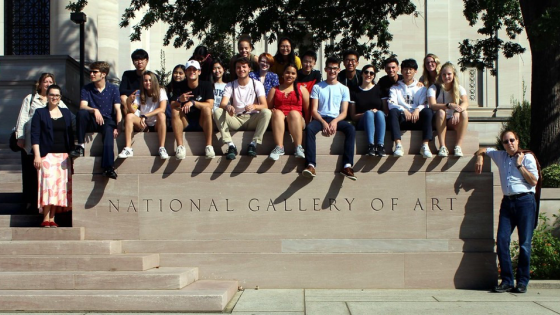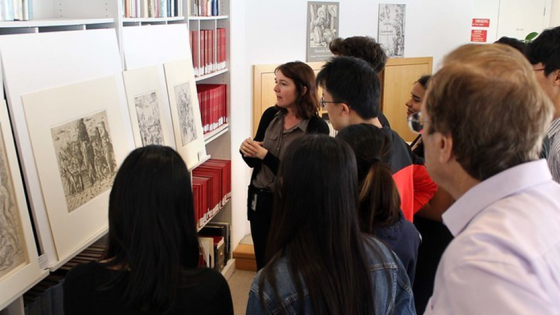Fall 2019 Focus Program: Science, Mathematics, and Harmony in the Renaissance
The fall 2019 MedRen Focus Program “Science, Mathematics and Harmony in the Renaissance” explored the many dimensions of science, mathematics, and medicine at the historical moment when ancient fields of knowledge were transforming the sciences and the healing arts at the beginning of the modern world. The courses focused in particular on features of science and medicine that make the sciences so fascinating in this period: the sense of wonder that nature evokes, the role of the imagination in scientific and medical discovery, the consequences of quantifying phenomena, the nature of empirical observation, the overlap of the arts and music with scientific knowledge, and applying hard-won knowledge and therapies to everyday life. A highlight of the Focus experience was the trip to Washington, D.C. to visit the National Gallery of Art and the Folger Shakespeare Library, among other sites.
Focus was overall very rewarding, and I especially appreciated the ability to build strong relationships with faculty members at an early point in my academic career. The courses were exceptional in helping me develop research and writing skills. They also gave me unique work experience with primary sources from the Rubenstein Library. The D.C. trip was a major highlight of the program—a very educational and fun break from typical classwork, and it was a great bonding experience for me and my classmates.
—Lindsay Dial
Dr. Tom Robisheaux, Professor of History, directed the program and taught “Engineers, Doctors, and Scientists in the Renaissance,” which explored themes in design and engineering, science, and medicine at the time of the Scientific Revolution. It was an “ArchivesAlive!” course that met in the Rubenstein Library and featured reading and research in original printed volumes, pamphlets, and broadsides from the Renaissance. The class studied the principles of design developed by Leonardo da Vinci for his works of engineering, painting, sculpture, and architecture. Then the students explored the revolution in modern medicine and chemistry brought about by the Swiss physician, Paracelsus, the “modern founder of pharmaceutical medicine.” They then turned their attention to the revolution in physics and astronomy with Galileo Galilei and the controversy of the Copernican system. In the final segment, the course explored the role of women in science through the life and work of Maria Sibylla Merian, a naturalist and artist who was captivated with the problem of metamorphosis in insects. Her ambitious explorations of the flora and fauna in a Dutch colony in South America opened up an entirely new scientific field of investigation (ecology) and fascinated readers of her work throughout Europe.
Focus introduced me to both the MedRen department and to Trinity College itself. Getting hands-on experience with texts, sharing living and learning spaces with classmates, and a trip to Washington, D.C. are highlights for me. Being a part of this was one of the best decisions I’ve made since coming to Duke.
—Sophia Cetina
Dr. Roseen Giles, Assistant Professor of Music, taught “Music, Medicine, and Natural Science,” which explored the history of music as medicine from antiquity to the present day. The class considered the intertwined histories of art and science through topics such as music and healing; musical understandings in human anatomy; harmony in the natural world; cultural studies of music and health; philosophy of sound in cosmology; and music as treatment in the history of medicine. Drawing on a variety of primary source materials digitally and in person at the Rubenstein Library special collections—from Plato through Ficino, Galileo, and Kepler, to contemporary debates on the efficacy of music in healing and prevention of disease—the course introduced students to the close connections that have and continue to exist between the arts and sciences. The goal was to understand how human creativity—the making and unmaking of what is true and what is false—has driven new discoveries in the science of medicine as much as it has in the art of music.
My experience teaching in Focus was particularly rewarding because all the students were deeply engaged with the material and often brought into my class thoughts and ideas to discuss from the other courses they were taking with Tom or Roseen. I can also honestly say that I looked forward to grading the students’ work! This was particularly true of the term projects. The students worked in groups for this assignment: one group created a mathematical trial of Cardano’s theories of probability and gambling; the other group rewrote and acted the trial scene of Shakespeare’s Merchant of Venice. Both projects were creative and thoughtful!
—Dr. Astrid Giugni
Dr. Astrid Giugni, Visiting Assistant Professor of English and Information Science + Studies, taught “Thinkers, Discoverers, and Problem Solvers.” Renaissance mathematicians theorized the probability of winning games of chance, fought duels over the solution of algebraic equations, and discovered imaginary numbers. Their discoveries, in turn, sparked the imagination of other scientists, artists, travelers, as well as of political theorists and writers—but does measuring and quantifying the world spark or suppress the imagination? Is mathematical discovery essential for a sense of wonder at the universe or does it destroy the poetry of the unknown? And how different is science from magic and alchemy? Taking up these questions as they were proposed by Francis Bacon in his Novum organon (1620), the class explored how Renaissance men and women interpreted the new discoveries in algebra, geometry, and probability. The students read, in translation, some of the original mathematical works that broke new ground in these fields and learned how to work with premodern mathematical conventions. Laying this groundwork enabled the class to consider how these discoveries influenced thinkers as different as Niccolo Machiavelli, Christopher Marlowe, and John Milton as they wrote about politics, religion, and literature.
MedRen Focus strengthened my love for the humanities through memorable conversations and collaboration. I learned that the best literature is deeply interdisciplinary, often bearing powerful connections to science, politics, religion, and law. I invested my heart and mind in souls of book characters I had never thought I’d have a chance to meet. Focus reinforced my perception that Duke is an interdisciplinary haven where science and humanities are united. Focus has made literature my lifeline to learning.
—Sibani Ram



